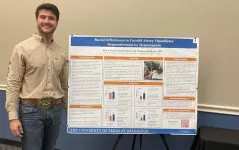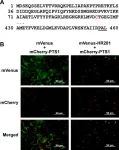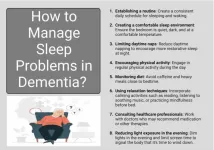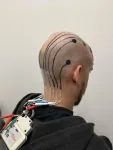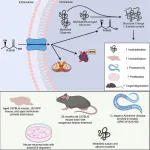(Press-News.org) UNIVERSITY PARK, Pa. — The more time you spend on social media, the likelier you are to have come across a viral post that seems too strange to be true. Brief scientific literacy interventions, especially those that focus on critical thinking skills, may help to undermine conspiracy beliefs and behaviors before the conspiracy theories have a chance to take root, according to a team led by Penn State researchers.
The team published their findings in the Journal of Consumer Research.
\“While some conspiracy beliefs may seem relatively harmless, others — about vaccines, genetically modified organisms and climate change, for example — pose risks to consumers and society,” said study co-author Lisa Bolton, professor of marketing and the Anchel Professor of Business Administration at Penn State’s Smeal College of Business.
The researchers conducted two studies in which they used national and international data to establish the connection between scientific literacy and conspiracy belief levels. They also conducted a series of eight science literacy studies, which included more than 2,700 participants in total, to determine how conspiracy beliefs can impact consumer actions and the effectiveness of scientific literacy to counteract such beliefs. They found that conspiracy beliefs — such as the ideas that agribusiness and big pharma are covering up the risks of genetically modified foods and vaccines, respectively — could affect what consumers choose to purchase or which medical procedures they decide to undergo.
They also found that brief interventions, like short videos focused on scientific knowledge and reasoning, undermined the conspiracy beliefs. The interventions were most effective against conspiracy theories built on faulty reasoning rather than narrative and against novel rather than entrenched conspiracies, even among high-conspiracy groups, according to the researchers.
The work suggests that educational interventions focused on expanding scientific knowledge and evidence evaluation skills can mitigate conspiracy beliefs, the researchers said.
“We need to get these interventions in front of people when they are facing important decisions. You can't rely on someone remembering a 3-minute video a year after they watch it, but a video in the waiting room of a doctor's office might be just in time,” said Nathan Allred, first author and assistant professor of marketing at Texas Tech University. Allred completed the work as part of his doctoral dissertation at Penn State.
In their initial studies, Allred and Bolton examined the relationship between conspiracy beliefs and scientific knowledge and reasoning. For instance, in one study they asked 299 participants to watch a 3-minute video — either explaining correlation and causation or on a completely unrelated topic — then read an article on a conspiracy theory about lab-grown meat. Then participants responded to prompts that measured their conspiracy beliefs, including being given one dollar and asked how much they would like to donate to a real charity that advocates for lab-grown meat to see how their conspiracy beliefs affected their behavior.
In these studies, the researchers found that participants were less likely to demonstrate behaviors indicating belief in the conspiracy after short scientific literacy interventions, especially ones that helped participants improve their evidence evaluation skills. These skills are especially helpful since they are applicable to most topic areas instead of being specific to one domain, the researchers said.
The latter studies looked at real-world assessments of how scientific literacy impacts conspiracy beliefs and behaviors. For example, in one study, the researchers wanted to see how COVID-19 conspiracy theories affected vaccination rates. They used science scores from the 2015 National Assessment of Educational Progress — the most recent scores available — as a proxy to measure scientific literacy in the 44 states that participated in the assessment.
Then the researchers looked at responses to an American News Pathways 2020 Project assessment from June 10, 2020, that asked participants to state how strongly they agree or disagree with the statement “that powerful people intentionally planned the coronavirus outbreak.” They measured vaccination rates and the percentage of fully vaccinated adults per 100,000 people in these areas. The data spanned from April 15 to July 30, 2021.
They found that Americans in states with higher scientific literacy scores were less likely to believe in conspiracies and had higher COVID-19 vaccination uptake rates over the time period.
“Public health messaging during the COVID-19 pandemic was fairly messy,” Allred said. “From what we learned from our intervention studies, I believe a greater emphasis on explaining the science behind how we knew what was happening and what we should be doing about it would have curbed the spread of conspiracy theories.”
END
Brief scientific literacy interventions may quash new conspiracy theories
2024-12-02
ELSE PRESS RELEASES FROM THIS DATE:
Illinois researchers examine teens’ use of generative AI, safety concerns
2024-12-02
CHAMPAIGN, Ill. — Teenagers use generative artificial intelligence for many purposes, including emotional support and social interactions. A study by University of Illinois Urbana-Champaign researchers found that parents have little understanding of GAI, how their children use it and its potential risks, and that GAI platforms offer insufficient protection to ensure children’s safety.
The research paper by information sciences professor Yang Wang, the co-director of the Social Computing Systems Lab, and doctoral student Yaman Yu is one of the first published sources of data on the uses and risks of GAI for children. Wang ...
UTA student recognized for research on high-fat diets
2024-12-02
University of Texas at Arlington senior Ken Perry has always been interested in how the heart works. This curiosity led the Arlington High School graduate to start working in the lab of UTA kinesiology Professor R. Matthew Brothers during his second year of college. Now, two years later, Perry is the recipient of two research awards from the American Physiological Society (APS) for his research on a connection between high-fat meals and cardiovascular health.
“I always wanted to learn about heart and blood flow, so when friend of mine interested in research encouraged me to apply for the SURPINT program ...
Smallest walking robot makes microscale measurements
2024-12-02
ITHACA, N.Y. – Cornell University researchers have created the smallest walking robot yet. Its mission: to be tiny enough to interact with waves of visible light and still move independently, so that it can maneuver to specific locations – in a tissue sample, for instance – to take images and measure forces at the scale of some of the body’s smallest structures.
The team’s paper, “Magnetically Programmed Diffractive Robotics,” published in Science.
“A walking robot that’s small enough to interact with and shape light effectively takes a microscope’s lens and puts it directly ...
Peroxisomal protein boosts plant immunity to thrive under environmental stress
2024-12-02
Salicylic acid is vital for protecting plants from pathogens, but its synthesis remains unclear. A recent study by Shinshu University researchers has discovered that the protein HSR201 is key to its production. They found that HSR201 localizes to specific organelles called peroxisomes through a unique targeting signal. This discovery improves our understanding of how plants produce salicylic acid and could pave the way for developing engineered crops with improved disease resistance.
Plant hormones, or phytohormones, are vital for plant growth, adaptation, and defense. ...
Critical relationship between stem cells and mechanical signals unveiled
2024-12-02
A new study from The Hospital for Sick Children (SickKids) and Institut Curie reveals how stem cells sense and respond to their environment, with implications for inflammatory bowel disease and colorectal cancer.
Stem cells constantly adapt to their environment to maintain organ and tissue health, informed by chemical signals and physical forces. When they do not function as intended, stem cells can result in a number of health conditions including inflammatory bowel disease (IBD) and colorectal (bowel) cancer, where they continue to divide until a tumour forms.
Until ...
A cause of hyperinflammatory response in lethal COVID-19 identified
2024-12-02
As part of the COVID-19 International Research Team, researchers at the Johns Hopkins Kimmel Cancer Center, Children’s Hospital of Philadelphia, the University of Pittsburgh and Weill Cornell Medicine discovered a novel cause of cytokine storm — the extreme inflammatory response associated with increased risk of death in COVID-19 infection.
Their findings were reported Nov. 27 in the online issue of Proceedings of the National Academy of Sciences.
In an intensive genomic search for causes of cytokine storm, the research team used autopsy samples obtained from 40 patients who died from COVID-19. They performed genome analysis ...
Sleep deprivation in dementia: Heart disease, diabetes, anxiety, and thyroid disorders
2024-12-02
"Sleep disturbances are a significant concern in individuals with dementia, affecting their overall health and quality of life, as well as that of their family members and caregivers.”
BUFFALO, NY- December 2, 2024 – A new review was published on the cover of Aging (listed by MEDLINE/PubMed as "Aging (Albany NY)" and "Aging-US" by Web of Science) Volume 16, Issue 21, titled, “Sleep deprivation in dementia comorbidities: focus on cardiovascular disease, diabetes, anxiety/depression and thyroid disorders.”
The review, authored by Upasana Mukherjee, Ujala Sehar, Malcolm Brownell, and ...
Temporary tattoo printed directly on the scalp offers easy, hair-friendly solution for measuring brainwaves
2024-12-02
For the first time, scientists have invented a liquid ink that doctors can print onto a patient’s scalp to measure brain activity. The technology, presented December 2 in the Cell Press journal Cell Biomaterials, offers a promising alternative to the cumbersome process currently used for monitoring brainwaves and diagnosing neurological conditions. It also has the potential to enhance non-invasive brain-computer interface applications.
“Our innovations in sensor design, biocompatible ink, and high-speed printing pave the way for future on-body manufacturing of electronic tattoo sensors, with broad applications both within and beyond ...
Ketone bodies: more than energy, they are powerful signaling metabolites that clean up damaged proteins
2024-12-02
Ketone bodies, produced by the body to provide fuel during fasting, have roles in regulating cellular processes and aging mechanisms beyond energy production. Research at the Buck Institute shows that ketone bodies can best be understood as powerful signaling metabolites affecting brain function in aging and Alzheimer’s disease. A new study demonstrates that ketone bodies and similar metabolites have profound effects on the proteome and protein quality control in the brain. Publishing in Cell Chemical Biology, Buck Institute scientists, ...
Implementation of electronic triggers to identify diagnostic errors in emergency departments
2024-12-02
About The Study: In this retrospective medical record review study, rules-based e-triggers were useful for post hoc detection of missed opportunities in diagnosis in emergency department visits. Interventions to target emergency department work system factors are urgently needed to support patient-clinician encounters and minimize harm from diagnostic errors.
Corresponding Author: To contact the corresponding author, Hardeep Singh, MD, MPH, email hardeeps@bcm.edu.
To access the embargoed study: ...

